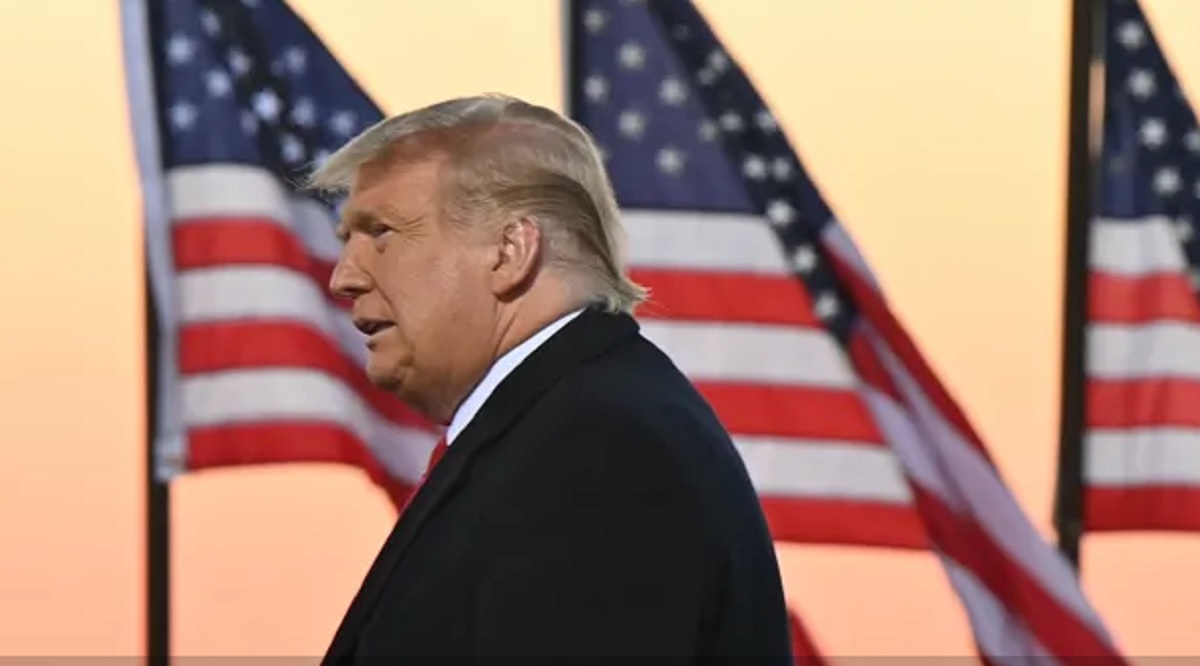In a groundbreaking ruling that echoes throughout the legal landscape, Colorado’s Supreme Judicial Council delivered a verdict on Tuesday, effectively disallowing the inclusion of former President Donald Trump on the state’s presidential primary ballot for 2024. This decision marks an unprecedented event, asserting a legal stance that suggests Trump, in his efforts to overturn the 2020 election, inadvertently sabotaged his chances for a second term.

Landmark Ruling: Trump Barred from Colorado’s 2024 Primary Ballot
The state court, expressing a 4-3 majority opinion, explicitly stated, “President Trump is ineligible for the presidential office.” This proclamation was accompanied by a justification that listing him as a candidate on the presidential primary ballot would contravene the election code due to his disqualification.
Despite the gravity of this decision, the Colorado court opted to delay its enforcement until early January. This delay grants Trump a narrow window to appeal to the U.S. Supreme Court, a move highly anticipated. If Trump proceeds with the appeal, it would thrust a historically significant question before the nation’s highest court, placing the legal intricacies surrounding the former president back into the hands of the justices.

Constitutional Conundrum: Interpreting the Insurrection Clause
At the core of this legal battle is the interpretation of the Constitution’s insurrection clause and the contentious issue of whether Trump incited an insurrection when his supporters stormed the U.S. Capitol on January 6, 2021. A district judge in Colorado had previously asserted that Trump had “instigated an insurrection” by agitating the mob at the U.S. Capitol. However, the judge held that the 14th Amendment’s provision disqualifying certain officials involved in insurrection did not apply to a sitting president. The Colorado Supreme Court, in a reversal of this decision, contended otherwise.
Legal Landscape: Colorado Court’s Unprecedented Decision
The court’s statement on the matter was deliberate, stating, “We arrive at these determinations with careful consideration. We recognize the gravity and significance of the questions before us. Our duty is to apply the law impartially, irrespective of public sentiment towards the conclusions dictated by the law.”
Swift Reactions: Political Responses to the Disqualification
Swift reactions ensued following the court’s decision. Trump’s campaign spokesman, Steven Cheung, commented, “As anticipated, the all-Democrat appointed Colorado Supreme Court has ruled against President Trump, supporting a left-wing group’s initiative to influence an election in prefer of Joe Biden via way of means of apart from Trump from the ballot.” Cheung pledged a prompt appeal to the Supreme Court, a move that would temporally nullify the practical implications of the state court’s decision. Until the U.S. Supreme Court renders its judgment, state officials would be obligated to include Trump’s name on the ballot.
The Colorado court stands as the first state judiciary to explicitly oppose Trump on this matter. In recent weeks, courts in several other states, including Minnesota, Michigan, and New Hampshire, have dismissed similar legal contentions.
This legal battle in Colorado, initiated by the watchdog group Citizens for Responsibility and Ethics in Washington, is just one among numerous lawsuits unfolding across the nation.
National Implications: Trump’s Appeal to the U.S. Supreme Court
CREW President Noah Bookbinder remarked, “The court’s decision today validates our claims in this lawsuit: Donald Trump is an insurrectionist who rendered himself unfit for office. It is not only a significant and justifiable ruling but also necessary to safeguard the future of democracy in our nation.”
While Trump refrained from commenting on the decision during a campaign rally in Iowa, Republicans swiftly criticized the ruling. House Speaker Mike Johnson labeled it a “thinly veiled partisan attack” and expressed confidence in the U.S. Supreme Court to overturn it. Senator Marco Rubio, in a social media post, likened the decision to actions that have prompted U.S. sanctions on other countries.
A candidate for the Republican presidential candidacy against Trump, Vivek Ramaswamy, denounced the decision and asked other contenders, including Nikki Haley, Ron DeSantis, and Chris Christie, to follow suit. Christie immediately expressed his disapproval of the ruling, stressing that people, not the courts, should decide if Trump is eligible, in contrast to his prior criticisms of the president.
Progressive groups, on the other hand, lauded the decision, asserting that the Colorado Supreme Court upheld the rule of law. Sara Loflin, executive director of ProgressNow Colorado, remarked, “Today is a triumph for the rule of law and the Constitution, affirming that propaganda cannot alter the plain meaning of words in the oaths sworn by our elected officials.” Democratic Representative Jason Crow defended the state high court’s decision, asserting that the Constitution protects the right to vote and disqualifies candidates engaged in insurrection, a criteria he believes Trump fulfills.
